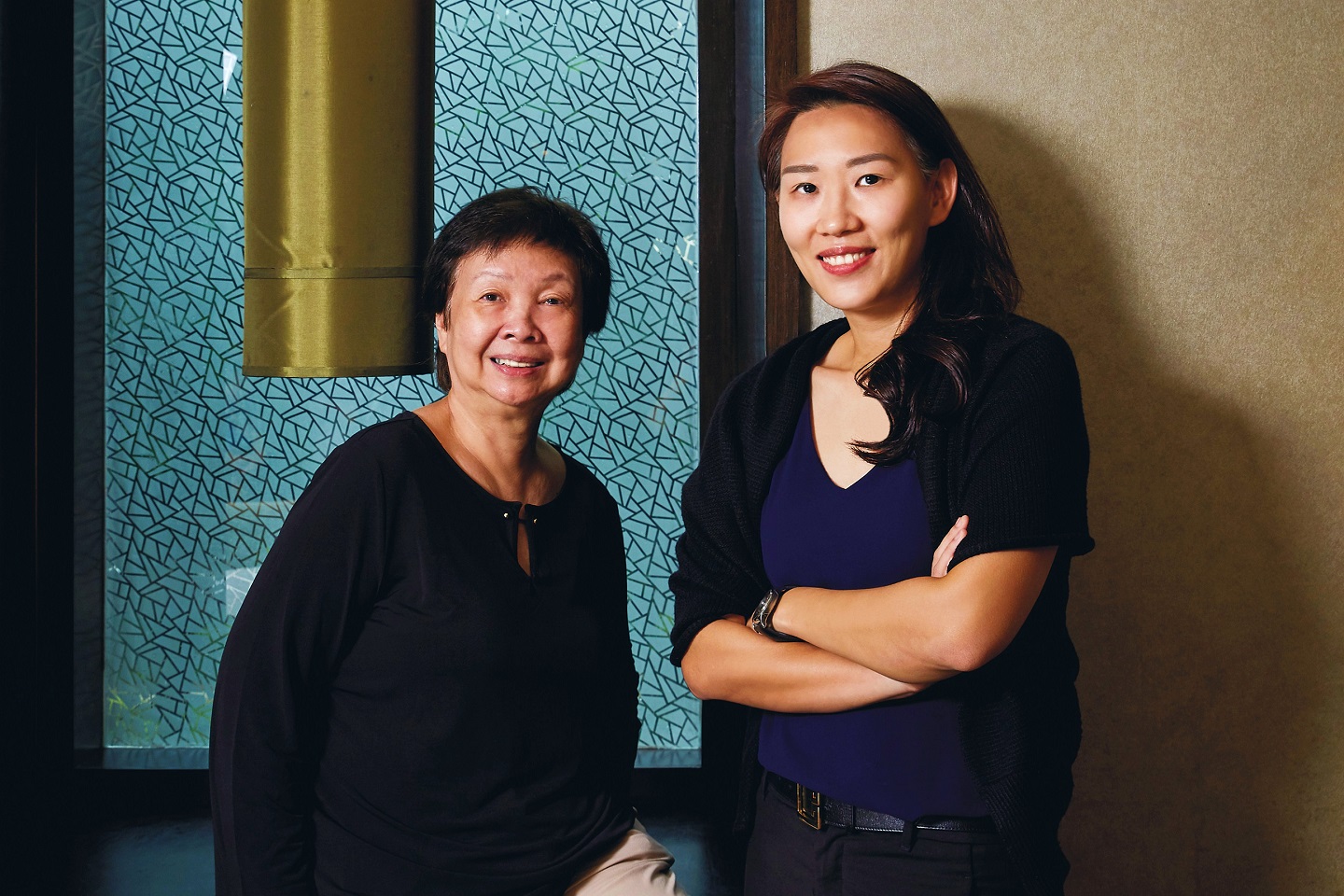
Ru Po (right) left her banking job to assist Bee Bee in running Marco Polo's digital marketing (Photo: Soophye)
Its very name evokes stories of Kublai Khan, Tatar knights and travelling by bridle path to Kandalu. To seasoned gourmets and gourmands alike, however, the name Marco Polo is less about the 13th-century travelogue he co-wrote with Rustichello da Pisa while both were imprisoned in Genoa, and more about good Chinese food.
Marco Polo Chinese Cuisine opened in grand style 42 years ago. Located on the first level of Wisma Lim Foo Yong — then one of the country’s first high-rise buildings — on the busy thoroughfare of Jalan Raja Chulan in Kuala Lumpur, its birth was the result of the passion for good food of one of the country’s famous self-made tycoons whose name adorns the 17-storey commercial structure. But the restaurant has faced its fair share of challenges, particularly of late.
Besides the change in dining trends and a veritable mushrooming of new establishments, Covid-19’s landfall in Malaysia has certainly proved to be the grand dame restaurant’s greatest tribulation so far. Two years of intermittent but strict lockdowns, compounded by a general fear of infection while dining out and uncertainty over income and whatnot, resulted in greatly reduced revenue across the board. “I can tell you our business fell by 93%,” says Lim Bee Bee, 66. “We were only allowed to do takeaways. Yes, we could still operate but it was pathetic. Some days, we barely made RM200 a day. It was a horrible time.”
Bee Bee is the daughter of Datuk Lim Foo Yong, the rags-to-riches millionaire who is perhaps best known for establishing the now-defunct Merlin brand of hotels. Lim passed away at the grand old age of 102 in 2016.
Now, Bee Bee works with her niece Lim Ru Po, 39, to carve out a new chapter for the iconic restaurant, ensuring it maintains its place on the city’s dining scene as a tribute to the patriarch’s legacy.
banquet_hall_2.jpg
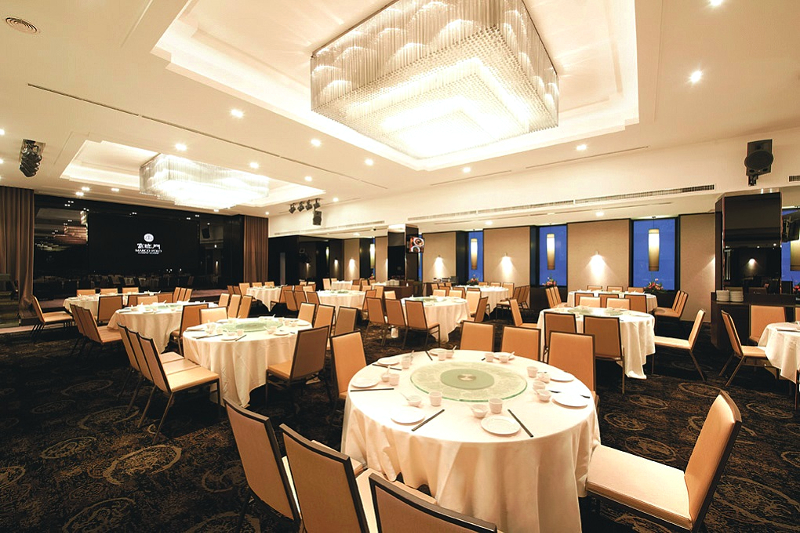
A TASTE OF TIME
It helps that good food will always be held in high esteem by Malaysians, with Marco Polo’s particular combination of quality and nostalgia seemingly just the thing we need in these uncertain days. Whether one dines in the main hall or the private dining rooms that bear evocative names such as Kublai, Cathay and Jade, dishes that evoke good times and heartwarming memories serve more than just to reinforce cultural and familial bonds; they make us feel grounded, comforted and, somehow, more connected with our sense of self and the social groups we identify with.
For many families in the Klang Valley, memories of a meal at Marco Polo do just that. For octogenarian Edna Tan, dining there is part of her family’s history and tradition. “I have been frequenting the restaurant since it opened over four decades ago. My family knew the late Datuk Lim and I remember how he would celebrate his birthday there every year in January. It was always a big do and the hall would be full. The food would, naturally, be very good. He loved to entertain and would serve the best things the restaurant could provide, from sea cucumber dishes to abalone. His family, friends, drinking buddies and business associates would all come. Yes, the dining scene in KL has since changed a lot, with young people having different ideas on how to enjoy Chinese food. But those who love a more traditional taste would still find Marco Polo the place to go. I still entertain there. The quality of the food is still good, as is the service.”
Tan Sri Leong Hoy Kum, founder and chief executive of Mah Sing Group, agrees. “It is a very old restaurant indeed, very famous and popular long ago. It used to be the place to dine, with very good dim sum. Renowned gourmet-about-town Datuk Kok Wee Kiat says, “I knew Datuk Lim, as we were conferred our Datukships by the late Sultan of Selangor [Almarhum Sultan Salahuddin Abdul Aziz Shah Al-Haj]. When he started Marco Polo in the early 1980s, China was only beginning to open up. Few Malaysians, particularly the English-educated, had ever visited China. So, the cuisine that Marco Polo served — and successfully so — was predominantly Cantonese and many Malaysians found novelty dining there. I have not been there in a long time but the restaurant’s name always stirs my sense of food adventure.”
marco_polo_1.jpg
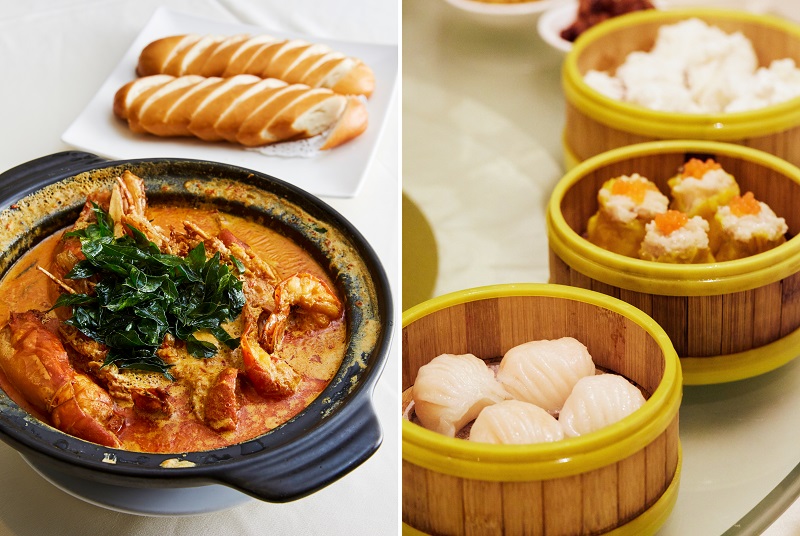
FOUNDER’S STORY
Foo Yong was born in Malaya in 1914 to Lim Khay Goh, who had left his ancestral village of Lian Bee in Fujian’s Anxi province on a ship to seek his fortune in Nanyang, the Chinese name for the Southeast Asian region, which literally means “southern ocean”.
“The bottom line is he started from zero,” says Bee Bee of her father’s humble beginnings. “He was born in Kuala Lumpur and was very poor. My grandfather passed away before he even turned one, so his mum brought him back to China. He lived there until the age of eight before returning to Malaysia. His older brother Lim Poon was his role model and he would follow him everywhere. They would collect old medical bottles to sell back to the pharmacies — a form of paid recycling, if you will,” she laughs. “He’d do all sorts of odd jobs on his bicycle. One day, however, he had a bad fall and couldn’t work for six months. So, he sat outside a classroom and just listened and absorbed whatever he could. That was his ‘formal’ education.”
Bright and precocious, the young Foo Yong soon mastered Chinese, bookkeeping, auditing and the art of business negotiations entirely on his own. His big break came after he purchased a plot of land and then sold it for a handsome profit. “It was Dad’s eureka moment when he realised the power of land and that property development was the way to go,” Bee Bee laughs.
A man who appreciated the finer things in life, Foo Yong’s epiphany for the Merlin hotel came after travelling to India on business. “He saw the five-star hotels there, which were then referred to as ‘first-class hotels’,” she recalls. “He said KL needed something of that standard and so began to conceptualise his vision of what a hotel should be.”
Foo Yong went on to establish the Merlin chain of hotels, beginning in KL (now the Concorde Hotel) in 1959, followed by Cameron Highlands (now owned by YTL), Penang (now the City Bayview) and many other places. Besides his namesake building, he was also behind the construction of the former UMBC Building on Jalan Sultan Sulaiman.
lim_foo_yong_marco_polo.jpg
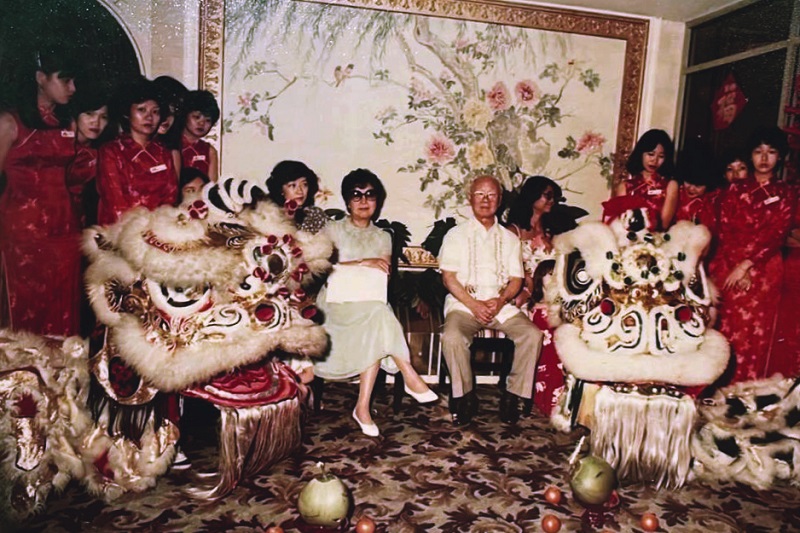
The Lim family residence then was a beautiful old-style house at 12 Jalan Sultan Ismail. “It was right opposite the Shangri-La Hotel and the street was known as Treacher Road then,” says Bee Bee, adding that an estate retreat is still maintained in the highlands.
“Dad also loved taking us to the movies. He would always make one of my brothers read out the cinema listings, which were printed out in newspapers daily. But everything my father did had a reason. He would watch movies often in the hope of obtaining ideas or inspiration. Films were our window to the world then, as foreign travel was still so expensive and a rarity. So, if it’s a James Bond film or a drama or comedy, we would most likely get to watch it, as there would invariably be a hotel scene or a modern, sophisticated setting. If it’s a vampire or murder show, there’d be no chance at all,” she laughs.
Despite his keen intellect, Foo Yong was, by all accounts, a man of few words. “He spoke like an English gentleman, though, something he picked up while socialising,” says Bee Bee. “I remember an incident when I was a teenager. My father had brought us to the Melaka Grill at the Hilton hotel. It was fine dining and very fancy. Even the maître d’ was a white man. I remember my father being presented with the menu, which he promptly closed and returned, saying he couldn’t read. The maître d’ laughed, thinking my dad had made a joke, but it was true — my father could not read in English but no one would have thought it.”
MARCO POLO TODAY
Today, a sense of nostalgia still permeates Marco Polo’s main and cavernous dining room. Just before the entrance is Marco2Go, which was started three years ago, offering easy meals and baked goods for those who need to grab something quickly. Inside, waitresses push trolleys bearing steaming baskets of dim sum, a charming service maintained to satiate the hungry lunch-hour crowd who want good food fast. “We still offer about a dozen dim sum items using trolley service, but only items whose taste stays optimum, like pork ribs and phoenix claws. Everything else is prepared to order,” says Bee Bee.
It is the star dishes, though, that keep the city’s culinary cognoscenti coming back — such as the Silver Thread Rolls, dipped in creamy prawn curry; Lotus Cabbage; Eight Treasure Duck; Beggar’s Chicken; and all the Cantonese roast and BBQ dishes. Those who enjoy poultry will never fail to order the Peking Duck. “Yes, our food is Cantonese but with some tweaks,” says Bee Bee. “Peking Duck isn’t Cantonese per se but it is a signature item and especially popular with our Japanese clientele, many of whom can eat a whole duck shared between just two people.”
Part of the reason lies in the provenance of the ingredients. Marco Polo takes great care in sourcing its produce, from meat to vegetables. Each duck prepared at Marco Polo hails from Silver Hill Farm in Emyvale, County Monaghan, Ireland. “It’s the same duck that the famous Chinese restaurants in London use. Try it and you will see it truly has a succulent flavour with the crispiest skin,” Bee Bee assures.
_s1a1256a.jpg
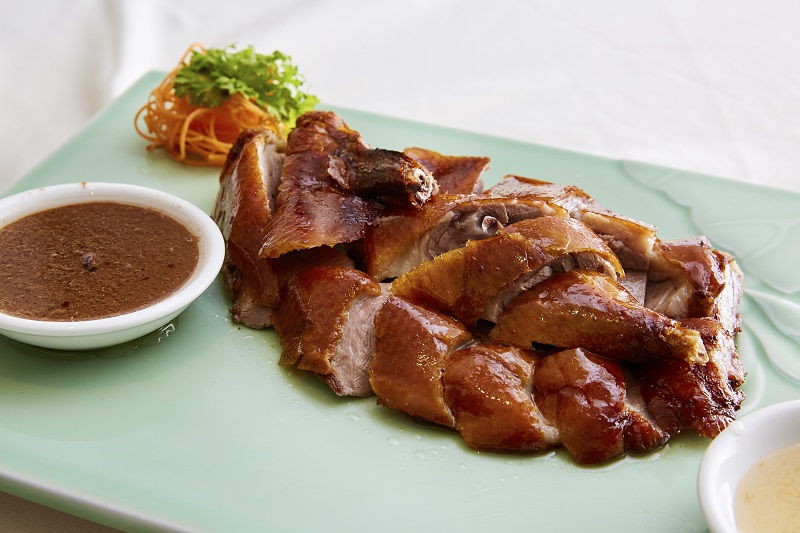
Preserving the family’s culinary legacy is what drives aunt and niece today. “I remember always visiting Gong Gong (grandfather) in his office after school and then having lunch at Marco Polo,” says Ru Po, who left a 15-year career in banking before joining her aunt to assist with Marco Polo’s digital marketing. “We, the grandchildren, all partly grew up here. It was my playground, and family dinner was a Saturday ritual when Gong Gong was still alive.” As a matter of fact, it was Ru Po’s father, O B Lim [one of Datuk Lim Foo Yong’s nine children], who managed Marco Polo from 1980 to 1998, after which his twin brother O T Lim took over, before passing the mantle to Bee Bee in 2007.
“Ru Po saw how desperate I was. That’s why she joined me last July,” says Bee Bee, only half-jokingly. “But she is a godsend as I am not tech-savvy, without the wherewithal to launch all our social media initiatives and promotions. Our sales have risen more than 300% since. Ru Po’s energy is incredible; she even takes on mooncake deliveries herself, driving and dropping the items off to her network of contacts.”
On the decision to still put in hard graft despite being able to live easily and comfortably, Bee Bee points out, “Marco Polo was very dear to my late father’s heart and that’s what drives me today — keeping his legacy alive. I remember how he would come every day for lunch, with #51 as his regular table, chosen for its vantage point so he could see who’s coming and going. He would always order char siew rice for the children while his favourite dishes were the siew yoke (roast pork), cheng yue (steamed fish) and sang har (river prawn).
“What keeps us going is also our staff, all of whom have been so loyal despite having to endure pay cuts and all that. They remain our encouragement and inspiration. We also love having people come up to us and say how they remember eating here as a child or celebrating their wedding and other happy occasions. To this day, I am always surprised and touched when people say they know Marco Polo. We used to be the dining room for the city’s elite. In my late father’s time, when the restaurant was in its heyday, we were famous for our leng lui (pretty girl) waitresses, all dressed in their signature qipao with side slits up to you know where,” Bee Bee laughs.
“Well, different people remember Marco Polo for different things. And now that there are hundreds of new players — from Grand Imperial to Noble House and the Oriental Group, all of which do a great, fantastic job. We aren’t in the top 10 of KL’s restaurants anymore but we have to evolve or die. Besides, the memory of my father, Ru Po’s grandfather, is still very much alive. Whatever one does in life needs to have meaning, doesn’t it? And I can tell you, a family that eats together really does stay together.”
This article first appeared on Apr 4, 2022 in The Edge Malaysia.


